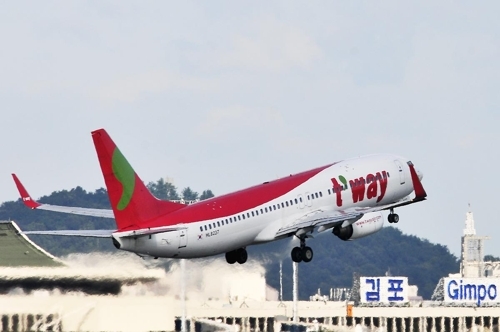South Korean low-cost carriers Air Busan and T'way Air Co. will set up new routes to Japanese cities as part of efforts to offset declines in demand from China, the companies said Friday.
The number of Chinese travelers has sharply declined following the ban on all travel packages to South Korea from March 15 onward amid a row between Seoul and Beijing over the planned deployment of an advanced US anti-missile system on the Korean Peninsula.
 |
An undated file photo of a South Korean budget carrier T'way Air passenger jet. (T'way Air) |
To offset declining demand on routes to and from China, Air Busan will open a route between Daegu and Tokyo on June 8, while increasing flights on the existing routes between Daegu and Osaka and Sapporo, the budget carrier said in a statement.
Air Busan is 46 percent owned by Asiana Airlines Inc., the country's second-biggest passenger carrier by sales after Korean Air Lines Co.
Meanwhile, T'way Air, an 80 percent owned unit of T'way Holdings, will start services on the Jeju Island-Osaka and the Busan-Osaka routes on June 30 and July 1, respectively, the company said.
Daegu is located 300 kilometers southeast of Seoul, and Busan is the country's southern port city, 453 km south of Seoul.
As the deployment of the Terminal High Altitude Area Defense system is in its final stages, China has strenuously opposed the deployment. Beijing claimed the move adversely affects its national security, although Seoul and Washington said THAAD is needed to better counter growing nuclear and missile threats from North Korea.
In South Korea, six low-cost carriers compete with each other mainly in domestic and short-range international routes. They also include Korean Air's budget carrier Jin Air; another Asiana budget carrier, Air Seoul; Jeju Air; and Easter Jet. (Yonhap)








![[Today’s K-pop] Blackpink’s Jennie, Lisa invited to Coachella as solo acts](http://res.heraldm.com/phpwas/restmb_idxmake.php?idx=644&simg=/content/image/2024/11/21/20241121050099_0.jpg)